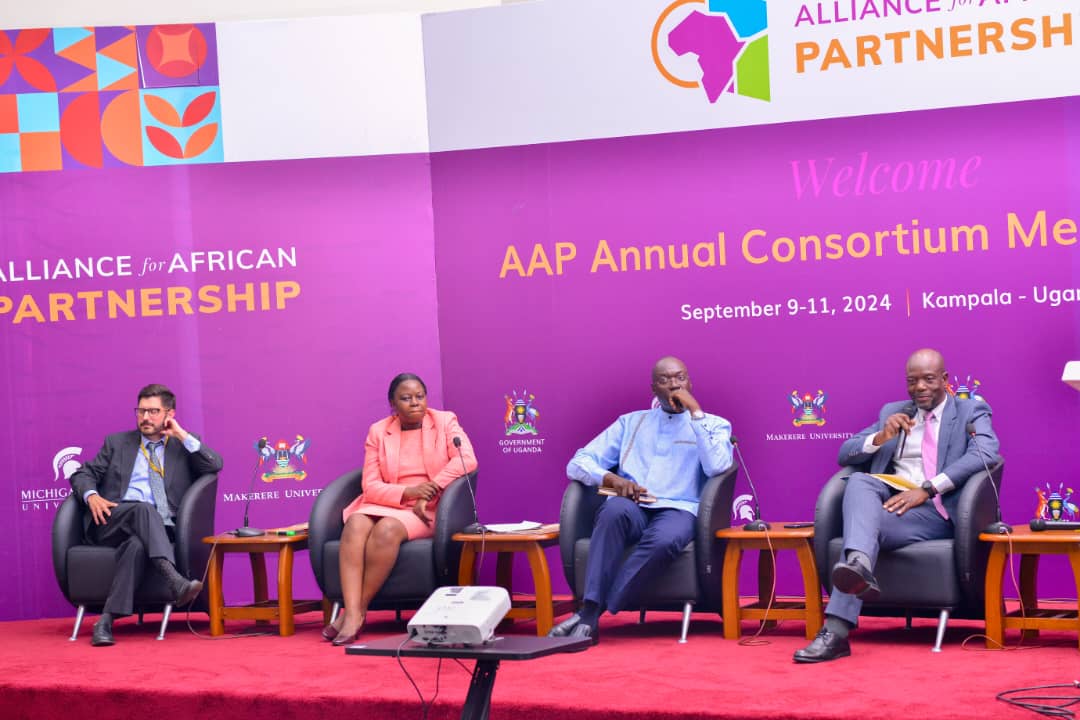University of Botswana Advocates for PhD Growth, Skills Development and Inclusion
 In a compelling address, University of Botswana (UB) Acting Deputy Vice Chancellor for Teaching and Learning, Professor Richard Tabulawa, has called for the expansion of PhD programmes, alignment of higher education with market needs and greater inclusion of marginalised communities in African universities.
In a compelling address, University of Botswana (UB) Acting Deputy Vice Chancellor for Teaching and Learning, Professor Richard Tabulawa, has called for the expansion of PhD programmes, alignment of higher education with market needs and greater inclusion of marginalised communities in African universities.
Professor Tabulawa made the call during a panel discussion at the Allaiance for African Partnerships (AAP) Annual Consortium Meeting held in Kampala, Uganda on the 11th of September 2024. Attending the panel discussion were AAP member university Vice Chancellors and/or their representatives, AAP advisory board members, staff, Michigan State University (MSU) leadership as well as Makerere staff, students and the general public including an on-line audience. The topic for discussion was Innovations in Higher Education Programmes and Practice: Taking Action in the African Union Year of Education (2024).
Drawing on Botswana’s educational transformation, Professor Tabulawa underscored the importance of innovation and collaboration among African universities to meet the continent’s urgent challenges in education, equity and development.
Reflecting on Botswana’s academic journey, he credited much of the Botswana’s educational growth to international partnerships, particularly with Makerere University. "I can claim some association with this institution, albeit vicariously," he observed, recalling notable Makerere alumni who had taught him and helped shape Botswana's higher education system.
He underlined how Botswana transitioned from relying on foreign lecturers to a point where 63 percent of UB academic staff hold PhDs with over half of them being Batswana. The success, he explained, was driven by UB’s Staff Development Fellowship (SDF) programme which identified talented young graduates and sent them abroad for Masters and PhDs.
“With the will, it is possible to increase the number of PhDs or produce the 100 000 PhDs that the World Bank expects Africa to produce,” observed Professor Tabulawa.
Given the declining government funding for higher education, Professor Tabulawa urged African universities to develop innovative strategies to sustain PhD training. He underscored the potential of "sandwich" PhD programmes which would allow faculty members to pursue doctoral studies while remaining employed at their institutions. Such programmes, he suggested, could be run jointly with institutions such as Makerere.
"Why can’t we produce PhDs together, working hand in hand with other African institutions like the University of Ibadan?" he asked, underlining the importance of collaboration across the continent.
Professor Tabulawa also addressed the importance of equity and inclusion in higher education. He commended Botswana for its affirmative action policy which relaxed admission requirements for students from marginalised communities and those with disabilities.
"We want to ensure that these individuals not only have access to education but access to quality education," he said. He pointed out that the policy had successfully brought historically marginalised students to universities. Consequently, he urged other African countries to consider similar approaches to achieve Sustainable Development Goal (SDG) targets related to equity.
On the issue of skills mismatch, Professor Tabulawa acknowledged the need for universities to better align their curricula with the demands of the job market. To that end, he noted Botswana has adopted an outcome-based approach to education to ensure that students graduated with requisite skills for successful careers. "If properly handled, this approach can take us far," he reckoned, notwithstanding the challenges that countries such as South Africa faced when implementing similar systems.
Professor Tabulawa observed that by working together and learning from each other’s experiences, African institutions could play a transformative role in the continent’s development, both academically and socially.